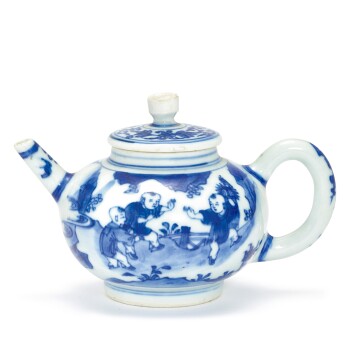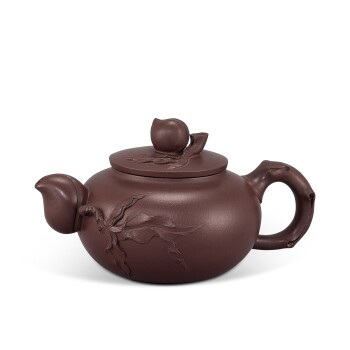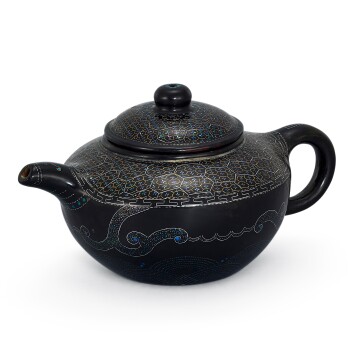To maintain the safety of clients and staff, this sale will be conducted using remote bidding only. Bidders wishing to participate in these auctions may do so by three methods: Leaving an absentee bid, Live online bidding, Telephone bidding (on lots with a low estimate greater than HKD20,000). Please email bids.hongkong@sothebys.com to register bids. Thank you for your understanding.
CHINA / 5000 YEARS auction offers works of art that showcases the rich heritage of Chinese art, exploring the broad range of flourishing and dramatic innovations evidenced through a variety of mediums. The sale this November is led by several private collections, including early ceramics from the Claire & Francis Heritage Lane collection, the third installment of Chinese jades from the Peony collection and a selection of jades from an old Hong Kong family collection.
Featured Highlights

A devout follower and patron of Tibetan Buddhism, the Qianlong Emperor commissioned the construction of halls and shrines dedicated to the recitation of Buddhist scriptures. These halls were lavishly furnished with Buddhist sculptures and vessels, including porcelain vases like the present one. The current vase is extremely rare and appears to be the only recorded coral-ground example of the period. Richly decorated with the bajixiang on a luxurious ruby-ground, the current vase belongs to a group of vessels produced during the Qianlong period in imitation of Tibetan metalwork, for use either in the Lamaist temples in Beijing or as imperial gifts to visiting Tibetan lamas.
Lot 459 | A FINE AND EXTREMELY RARE CORAL-RED GROUND FAMILLE-ROSE ALTAR VASE

SEAL MARK AND PERIOD OF QIANLONG
ESTIMATE 800,000-1,200,000 HKD
VIEW LOT


“Art is continually haunted by the animal.”
For thousands of years stretching back to the days of prehistoric cave paintings, our art has taken as subject matter flora and fauna of all kinds. These projections shape the way we understand our own natures and dwell in the imagination as a symbol for our origins and the evolution from nature to culture. The impulse to assign symbolism to animals is linked to our awareness of what it means to be human, and this understanding connects art and cultures throughout history. Animals in Chinese art have long been a way of conveying philosophical and sometimes political meaning in a sophisticated visual language of cultural associations and wordplay.
“The Chinese define animals in nature in a very specific way, through concepts like yin-yang cosmology,” Hou-Mei Sung, curator at the Cincinnati Art Museum and author of Decoded Messages: The Symbolic Language of Chinese Animal Painting, said in a 2009 interview with Citybeat Cincinnati. “A tiger is not just a wild beast or animal, but almost a living symbol.”

The practice of appreciating tea is at the same time a thing of the everyday and a medium for reflection and self-cultivation. The tradition, which has evolved over time, seeks harmony between human and nature. The teaware itself serves an important ceremonial role as an intermediary in the appreciation of this philosophy, and so must create a balance between functional object and aesthetic experience.
- Blue and White
- Famille-Rose
- Grisaille
- Yixing
- Blue and White
- Kakiemon
- Yixing
-
 A BLUE AND WHITE 'BOYS' TEAPOT AND COVER
A BLUE AND WHITE 'BOYS' TEAPOT AND COVER -
 A FAMILLE-ROSE 'BIRDS' TEAPOT AND COVER
A FAMILLE-ROSE 'BIRDS' TEAPOT AND COVER -
 A GRISAILLE-DECORATED TEAPOT AND COVER
A GRISAILLE-DECORATED TEAPOT AND COVER -
 A YIXING 'PEACH' TEAPOT AND COVER
A YIXING 'PEACH' TEAPOT AND COVER -
 A BLUE AND WHITE TEAPOT AND COVER
A BLUE AND WHITE TEAPOT AND COVER -
 A KAKIEMON TEAPOT AND COVER
A KAKIEMON TEAPOT AND COVER -
 A VERY RARE YIXING LAC BURGAUTE TEAPOT AND COVER
A VERY RARE YIXING LAC BURGAUTE TEAPOT AND COVER

The ‘Art of Tomorrow’ Collection - A Contemporary Perspective into Song Ceramics

With a combination of works by Asian and Western blue-chip artists as well as emerging local talents, the Chu Foundation, founded by Hong Kong-based art patrons Natalie and Lawrence Chu, represents a distinct perspective from Hong Kong where the Chu family is rooted. Its diversity in expression reflects Natalie and Lawrence’s belief that art can spark innovation and enrich lives.
In addition to modern and contemporary works of art, the Chus, by virtue of their interests in earlier technological advances, are also passionate about Song dynasty ceramics, of which the production was undeniably unparalleled by contemporaneous global standards. The diversity in Song dynasty ceramics is also congruous with their eclectic sensibilities. The selection of ten Song - Ming dynasty ceramics offered in this sale include examples from the Northern and Southern kilns. Comparable to the sherds found in the archaeological sites on the Silk Road, the lots on offer serve as a window into the prosperous trade and cultural exchange in which they are steeped.

























